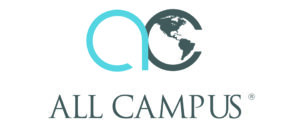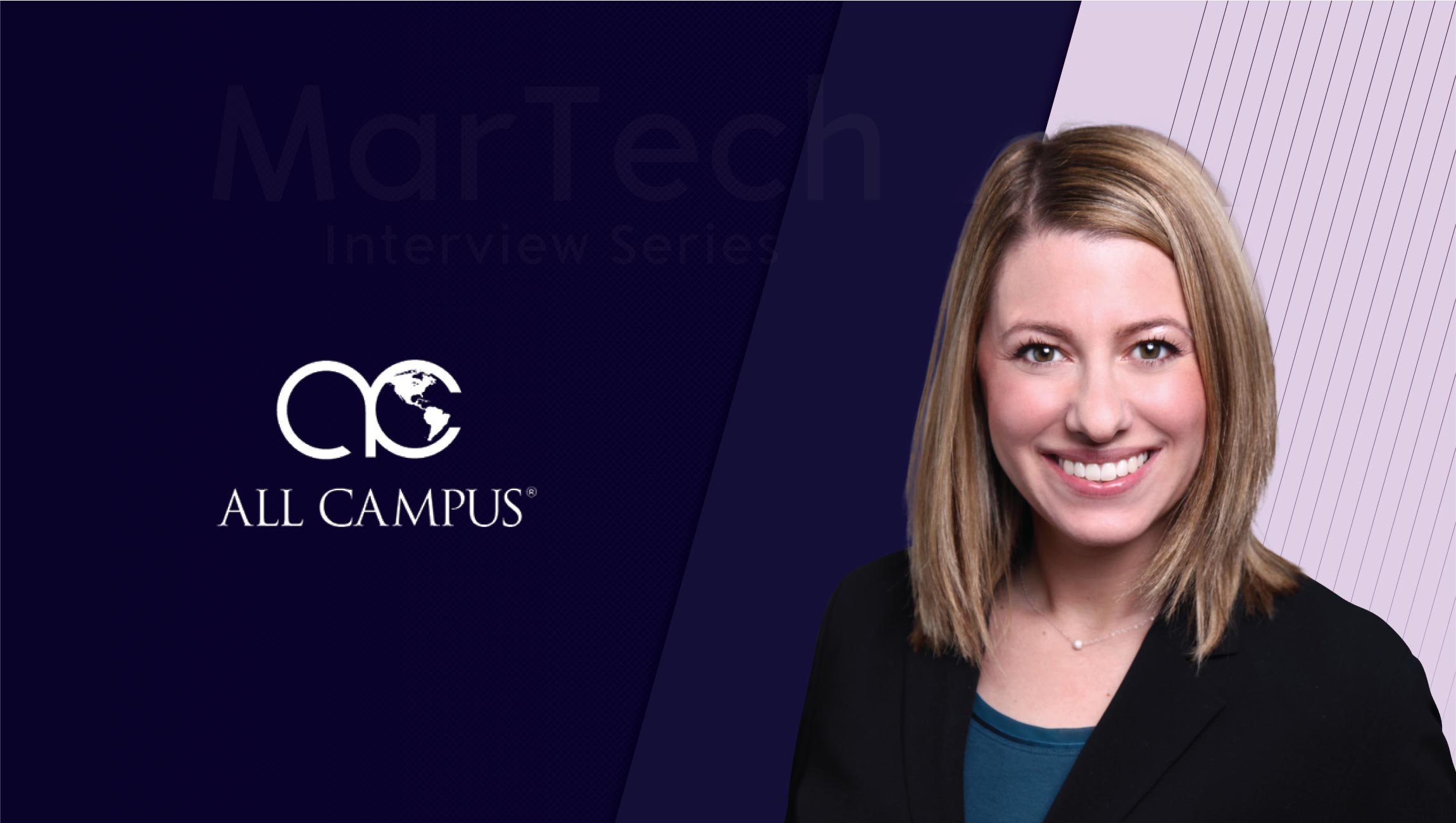“The fields of marketing and technology are inescapably intertwined. You can’t be a marketer unless you’re harnessing data in some way, and with the vast amount of data we deal with day-to-day you have to have technological help.”
[/vc_wp_text]
Please tell us about your journey into marketing technology and how you started at All Campus.
The fields of marketing and technology are inescapably intertwined. In my opinion, you can’t be a marketer unless you’re harnessing data in some way, and with the vast amount of data we deal with day-to-day you have to have technological help.
I started at All Campus almost 8 years ago coming from Kaplan University, which is now primarily Purdue Global. In my prior role I was constantly struggling to get access to the right data and reporting when I needed it. Even though it was still a young company at the time, All Campus had a smart, entrepreneurial team. They were able to build reporting technology from the ground up that provided me with the real-time insights I needed, merging data from our customer relationship management (CRM) tool, UTM tracking strings, and other sources to package it into usable dashboards with projections. It was amazing then, and it’s been exciting to see our enhancements to that technology over the years — including building our own, proprietary CRM, Archa, that reports lead attribution. Other 3rd party technology that we use regularly includes our A/B testing platform, UX platform, video tracking software, email automation platform, social media management and social listening system, and accessibility compliance tools, along with others that help us adjust our media strategy. They all serve a great purpose and help us optimize to make the experience for prospective students the best it can be.
What unique lessons in marketing and sales did you evaluate during the COVID-19 crisis? How did your experience in working with marketing technologies help ease the pressure off your team and company?
We are in one of the few sectors — online education — that experienced an increase in interest during the onset of the pandemic, but it was still a very chaotic time. The universities we serve and the audiences within each were affected in a variety of ways — some positively, like broader business degrees, and others negatively, like select education and health-related programs. Our in-house marketing stack allowed us, in real time, to evaluate these changes rapidly, so that we could prioritize our responses across our portfolio and ensure that we were servicing our prospects and university partners appropriately.
Tell us more about All Campus and the ideal customer profile. Which industries and titles are you currently targeting?
All Campus partner universities are made up of the top 150 colleges in the country. We primarily focus on student recruitment and retention for their master’s degrees offered in multiple modalities (online, hybrid and on-campus) and professional certificates. We have a portfolio of over 60 individual degree and certificate programs that attract professionals with a variety of job titles — from data analysts, to art and music teachers, social workers (existing and aspiring), paralegals, and more. There isn’t a sector that we don’t cover at this point, really.
How easy or difficult is it to actually create a marketing campaign for online education programs?
We’ve been doing this for a long time, and as a result, have a good framework for how to launch, grow and sustain a new online graduate program. Marketing is all about delivering the right message to the right audience at the right time. If you have a standout program with fantastic messaging and the audience is right, but the prospect is still in research mode, what can you do to help your program remain top-of-mind, so that when they’re ready, you’re part of their consideration set?
Alternatively, if you know a prospect is motivated based on their search query (i.e., you have the timing) and you’ve pin-pointed the appropriate audience, what is it about the school or the program that you can say to cut through the noise and make this program stand out among the others? We’ve learned that audiences behave very differently from one another. For example, graduate education prospects in the education field consume content in a different way to those interested in MBA programs. Expectations of prospects interested in smaller, regional institutions differs from those seeking a program at a top-ranked business school. We always start from a good baseline, but you have to let the prospective student tell you what is best and use that information to guide you. Sometimes this is in contrast to what you thought would work or what your university partner wants, which can be a difficult hurdle to get past together.
Tell us more about your recent digital marketing efforts and how you measured its ROI and effectiveness.
We measure the effectiveness of our marketing efforts with the Return on Ad Spend (ROAS), which is the ratio of how many dollars we earn for every dollar we invest along with the overall cost per student start. Our tracking capabilities allow us visibility into the full student journey from the moment they visit a landing page from a paid ad through graduation based on the individual query they used in their search. This allows us to see which keywords are generating students and which aren’t and optimize our campaigns accordingly. The more efficient we can be with our efforts, the more efficient we can be with our partnerships, passing that savings on to our university partners and, most importantly, their students.
How much have you spent / retracted from your marketing budget in the last six months?
Without getting into proprietary areas, I can say that, for the most part, our budgets have grown over the past 6 months – and have done so relative to the increased interest online education has experienced during that timeframe.
What does your remote workplace collaboration technology suite look like?
We use Slack for internal instant communication and socialization, message board functionality and instant video conferencing. The marketing team also utilizes Trello for cross-team project management and Atlassian’s wiki for knowledge sharing. Additionally, we use the Google suite to collaborate on individual documents.
Online Education platforms are one of the leading adoption centers of Video and AI assistant tools. What are your predictions for the future of online education built on these two advancing technologies?
It won’t happen right away, but virtual reality (VR) has big potential to bring the classroom experience to people everywhere. I’m sure you can imagine plenty of really amazing applications to create a more immersive educational experience than 2D video case studies and two-way video currently provide. Adaptive learning has also been an emerging trend in online education for a while now. This could be bolstered by AI — customizing learning to each student based on weaknesses they’ve demonstrated in their coursework vs. strengths. This could create an extremely personalized learning experience for students and consequently improve educational outcomes.
What is a unique digital marketing campaign that inspired you?
Wow, it’s difficult to pick just one. Our industry, like many others, has faced such tremendous challenges this past year in the face of COVID-19. Many of my colleagues who sit in university marketing departments had to deal with significant change in such a short time — from finding their entire library of images to be inappropriate (No masks! Students are not social distancing!), to changing admissions requirements (goodbye GMAT!), to knowing everything they decided about their campaigns yesterday may change tomorrow based on updated university decisions and policies. I don’t think there’s any individual campaign that inspired me as much as the people working day-by-day in university marketing departments and making it work! Our online community groups have been such collaborative spaces and everyone has been helping each other out. It’s been really amazing to see.
What is a piece of advice you have for all young female marketing professionals?
I think my advice is applicable to any marketing professional regardless of gender identity. I’d say, even if you find yourself in a specialized role — research, paid search, SEO, social media, branding, design, content development, traditional media buying, whatever it may be — never forget your place in the full marketing picture. It’s important to understand how your specialization is impacted by and can impact others. You are part of an integrated system that works best when the puzzle pieces fit together. Work to knock down silos by avoiding staying inside one yourself. Look outside of your role, and you might find something that you can contribute to others outside of your discipline and vice versa.
Is there a person in the marketing space whose answers you would like to see here? If so, share their name.
Tim LeCroix – Director, Global Business Insights and Strategy at University of Chicago
Thank you, Andrea! That was fun and hope to see you back on MarTech Series soon.
With nearly 20 years of marketing experience, Andrea serves as the Executive Vice President of Marketing of All Campus, bringing extensive digital, traditional and academic strategy expertise to the All Campus team. Her previous role as Director of Marketing at Kaplan University has established Andrea as a metrics-driven supervisor for creative, research, and student recruitment. Andrea’s role guarantees consistent targeting, branding, and communication from client to third party vendors and agencies, keeping the marketing and admissions team abreast of competitor and environmental impact and niche opportunities.
As a manager to the content and research team and partner to creative and search engine staff, she nurtures projects and campaigns from start to finish with the goal to exceed program objectives, increase student engagement, and introduce new media practices. Andrea graduated with honors from Miami University (Ohio) with a Bachelor of Science in Business and a concentration in Marketing.

With nearly 30 years of experience as a digital marketing and creative agency, All Campus partners with leading, traditional institutions of higher education to expand online enrollment. We provide the up-front marketing investment, expertise, and service level required for success.
We don’t believe that design templates, pre-packaged solutions, and mechanical, uniform methods can possibly account for the unique voice and target of our clients and their programs. Everything we build for our partners – whether a marketing strategy or a focused, one-of-a-kind design – is an original creation designed to suit their specific needs and goals.
Guided by our experience interacting with students from a wide variety of fields and backgrounds, we create a customized, specialized service offering to capture any audience. Each of these solutions is shaped by hard data and proven results, creating the effective blend of science and creativity that characterizes everything we do.












Comments are closed.